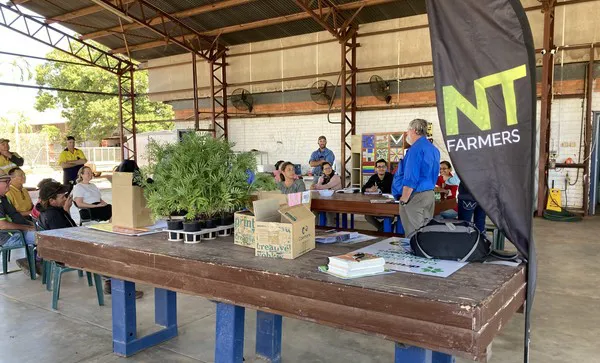Regional vegetable producers in Katherine, 320km southeast of Darwin in the Northern Territory, recently had an opportunity to participate in a discussion about the challenges, problems, and opportunities they believe are at the forefront of their production systems. VegNET Regional Development Officer Simone Cameron provides an overview.
This timely meeting of local Katherine producers is in line with the commencement of VegNET Phase 2, which is focusing on the development and implementation of a Regional Strategic Plan for 2020-2025. It aimed to identify and prioritise key regional issues that will support our vegetable growers to grow healthy crops, and to develop successful and profitable businesses.
The Northern Territory is one of the younger regions for horticulture and vegetable production in Australia. There is a need in this developing region to engage with growers to build relationships for improved best practice. The area around Katherine is well-positioned to grow a variety of vegetable crops during the months of April through to September, meeting national and export market demands for produce that cannot be grown in the southern states over the winter months. Pumpkins are the major crop along with zucchinis, tomatoes, eggplants, capsicums, and asparagus.

Water in-focus
The region experiences two very distinct seasons: Wet and Dry. Typically, the Wet Season runs from December through to the end of April when the total annual rainfall is met. The remainder of the year is the Dry Season, when no rain is experienced – and this ideal for vegetable growers.
The last two Wet Seasons have been particularly poor, and the 2019-2020 season was well-below average. We have also experienced extended above-average temperatures, which has seen many growers adjusting their on-farm management practices to ensure that the seasonal produce can be productively and economically grown. The region has been placed on a water allocation plan for this growing season, which was based on their previous season’s use as well as groundwater aquifers not receiving adequate annual recharge. The water allocation plan has presented several challenges for many Katherine growers, with most choosing to plant less this season as a result.
Supporting regional development
Through previous project findings, it has been recognised that continual and regular engagement is needed to reassure growers of our ongoing support. Growers see this as value-adding to their business practices.
Considering this, NT Farmers Association Industry Development Manager Greg Owens and I met growers, researchers and industry specialists to discuss and prioritise the key issues for the Katherine region to enhance and support its future development.
The focus group was held at Katherine’s Food Ladder hub, a point of interest for many locals in the region. Food Ladder Horticulture and Training Manager Scott McDonald was pleased to offer the site for the session.
“It’s great to have and see industry collaboration in the region,” Mr McDonald said.
It was an opportunity for Food Ladder to showcase its hub as a source of locally grown, sustainable and valuable products. It is also a key reminder for everyone that fresh, locally-grown produce provides great value to any community.
Growers were very interested in the on-site climatically controlled greenhouse system, highlighting the potential for a protected cropping development in the north.
Other key areas discussed were water and water efficiency practices; understanding and improving soil health to assist with productivity; the implementation of Integrated Pest Management practices to reduce the amount and reliance on conventional practices; as well as establishing better supply connections between growers, local and remote community stores and the hospitality industry in the Top End.
The focus group was a wonderful opportunity for our levy payers to engage in what they value as important for the long-term sustainability of the industry. The key messages from this session will assist with developing a bank of potential project opportunities that can be rolled out with the emphasis being on high stakeholder engagement and delivery.
For more information:
Simone Cameron
NT Farmers
Email: bio@ntfarmers.org.au
